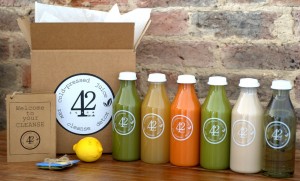By Anthoney J. Andersen – Steroidal.com
With summer coming to a close, the holiday seasons begin to approach with grand acceleration.
Family. Fun. Alcohol. Weight gain.
The latter of the bunch is what concerns many Americans the most, especially if you worked your muscles to the bone in order to maintain that beach body.
So, what’s the fastest and most efficient way to maintain your weight through the holidays, or at the very least, find a way to dissolve the weight as quickly as possible after all the turkey, mashed potatoes and apple pie find their way to your waistline?
One diet that has grown in popularity in the past few years is the juice cleanse. But is keeping your body on a strict – liquid only – diet the most healthy thing?
Does it actually do more harm than good? Or does it actually rid your body of all the unsavory toxins accumulated over the course of your life?
Let’s find out.
If you’re looking for a quick and easy fix to your weight loss problems, then you might be considering going on an all juice diet – which will help you consume a vast amount of vitamins and minerals, while watching your caloric intake.
However, while cleanses may seem like a good idea for a short term fix, it may not be the most beneficial route to take when it comes to maintaining proper health.
“There’s not a lot of scientific evidence to prove that cleanses work,” says Lauren Blake, a registered dietician with The Ohio State University Wexner Medical Center.
“When you’re restricting your calories so heavily, you’re going to lose weight, but people who follow these cleanses tend to put the weight right back on and leave themselves at risk of developing nutritional deficiencies.”
According to the American Heart Association, the recommended daily caloric intake for most healthy adults is 2,000 calories per day.
But the amount of physical activity you endure a week, depends on whether or not you should increase or decrease the amount of calories you consume daily.
“Many cleanses restrict people to less than 1,000 calories per day, leaving their bodies running on fumes,” says Caroline Cederquist, a physician specializing in nutrition and founder of the diet food delivery service – bistroMD.
The following is the recommended daily caloric intake for teens and adults based on the amount of weekly physical activity:
| Age | Not Active | Moderately Active | Active |
| Female 14-18 | 1,800 | 2,000 | 2,400 |
| Male 14-18 | 2,200 | 2,400-2,800 | 2,800-3,200 |
| Female 19-30 | 2,000 | 2,000-2,200 | 2,400 |
| Male 19-30 | 2,400 | 2,600-2,800 | 3,000 |
| Female 31-50 | 1,800 | 2,000 | 2,200 |
| Male 31-50 | 2,200 | 2,400-2,600 | 2,800-3,000 |
| Female 51+ | 1,600 | 1,800 | 2,000-2,200 |
| Male 51+ | 2,000 | 2,200-2,400 | 2,400-2,800 |
“Juice cleanses are usually low in protein,” says Cederquist. “And when you don’t have adequate protein in your body, it breaks down muscle tissue instead. Cleanses can actually cause you to lose muscle, not fat.”
THE DAMAGING EFFECTS
Even though juice cleansing can add additional servings of vegetables and fruits to your diet, it can also be a dangerous avenue for a person with dire health problems.
Cancer patients who are undergoing chemotherapy, diabetics, individuals with nutritional deficiencies and people with kidney disease are advised not to attempt a juice fast/cleanse.
The sugar content alone in juice fasts can catapult a diabetic’s blood-sugar levels through the roof, which can result in fatigue, unexplained weight loss, blurry vision, excessive hunger and thirst, and wounds or infections that heal slower than usual.
According to Livestrong.com, the elevated levels of potassium from copious juice consumption can build up in the blood to dangerous levels in those with kidney disease.
“While the juice form does hydrate and supply the body with an excessive amount of nutrients, it actually eliminates the fiber and antioxidants found in the skins and seeds of fruits and vegetables,” says registered dietician, Jennifer Nelson.
According to Food Republic, since juice doesn’t offer the fiber contained in fruits and veggies, the body tends to absorb higher levels of fructose sugar more easily, which can affect blood-sugar levels.
CONCLUSION
Juice cleanses alone leave out many vital minerals and nutrients, which can leave your body struggling to function at optimal efficiency.
There’s a reason that most diet plans require a plethora of various food categories: it’s because following just one won’t allow your system to fully embody all the diet has to offer.
Choose wisely.

